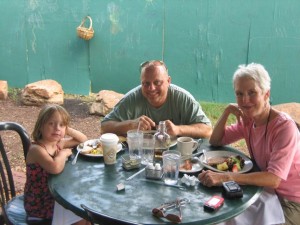
Burton Knight, with his daughter, Talula, and his mother, Toni Inglis, has managed to survive despite a childhood without a decent pecan tree.
An Austin tradition for 34 years, the Pecan Street Festival is happening this weekend. Hearing the name never fails to take me back to my son Burton’s 2005 email.
For Christmas, he and his family had given me and Ian a nice bag of cracked pecans. Their majestic backyard tree in Dallas had produced 120 pounds that year.
I emailed his wife, copying Burton, to thank her and to tell them how plump, nutty and juicy they were, with a wonderful flavor.
I explained to her that when Burton was growing up, we had a large pecan tree over our back patio and that the pecans from it were not particularly memorable. I then innocently added, “Burton, do you remember that tree?”
Burton “replied all” in classic, characteristic form. (You may have read some of Burton’s reflections on these pages before.)
FROM: Burton Knight
SUBJECT: Re: Thank you for the pecans!
DATE: January 15, 2005
As a child who lived through that dark period, let me just say that I can’t ever forget the pecan tree. To a helpless and vulnerable child, the seemingly innocent moniker of “pecan tree” meant: omnipresent-and-abusive-symbol-of-our-pathetic-caste-in-society tree.
That’s right, the pecan tree was my social pink elephant in the room that nobody would acknowledge, but everyone could see.
Sure we lived in Tarrytown, but that tree in our backyard was a clear beacon to all who beheld our sorry hovel that we were basically the “Pecanos,” “Pecan-Americans” or “Nut Brothers” of the neighborhood.
We vainly hid behind our aluminum siding, fancy brick walkways and hardwood floors, trying desperately to fit in. Yet it was clear we were different. All thanks to that tree! Oh, if I could have my adolescence back without the SCARLET LETTER that was our PECAN tree.
How I hated it. Children can be so cruel.
I was constantly ridiculed and assaulted with rocks because of our special pecan tree. Had it been a source of food or a thing of beauty, I might have been merely pitied instead of scorned.
But no. The sentinel of our back patio had to be a living (expletive)-stick, lousy with squirrels and fall web-worms, that only occasionally blessed us with nuts whose rotten and flavor-impotent nutmeat’s wizened staleness was rivaled only by their diminutive yet indestructible shells that littered the patio like broken glass under our feet.
Yet we lived with it like one would live with a family member who refused to wear clothes and beat us in public.
Living in the fetid shadow of that hideous arboreal abortion, I managed to survive by self-medication and a Mohawk.
My sister tried to escape through academic excellence and togetherness. My brother, John, tried to rebuild his life by fleeing to Texas A&M to study history. All for that (expletive) tree.
Were we too (expletive) poor for dynamite? Perhaps we were Austin’s legendary idealistic hippies, too compassionate to euthanize the woody stain on their children’s social status?
Well, you’re damn right our Christmas pecans are plump, nutty and juicy with a wonderful flavor. The tree is beautiful, too. Life is different here in Dallas. We use deodorant and pay taxes.
So, dredge up the past if you must, just know this: My wife already knows how it was and Talula will know when she’s old enough to handle it.
I am no longer ashamed of the past and have moved on to a “plump, nutty, juicy” place where I feel safe and clean. Those flavorful nuts are who I am now. Can’t you just be happy for me?
Your son,
Burton

 Austin, Texas
Austin, Texas